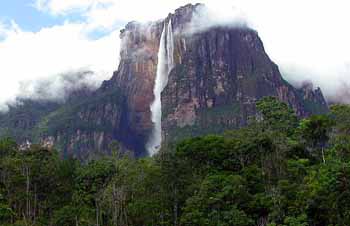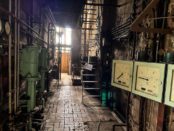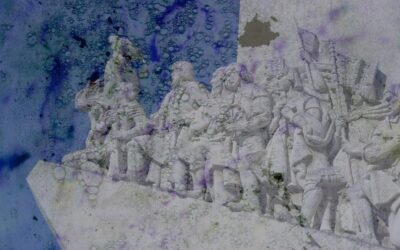In the Bevere community, located outside Tucani, Venezuela the push for agricultural reform and ‘endogenous development’ is the government’s reported attempt to reduce the poverty and inequality which has beset this petroleum-rich nation for generations.
With financial and technical support from the state and its various institutional mechanisms, the landless and the unemployed are being encouraged to re-populate the countryside and exploit the natural richness of Venezuela’s soil through cooperative work relations and shared titles to previously uncultivated land. The result has been a fortification of allegiances as new agricultural collectives and communities grow up on these expropriated lands and earlier sacrosanct ideas regarding private property, entitlement, citizenship, and individual rights have become violently contested cultural terrains. Trebuchet’s political editor Edward Ellis investigates.
On March 3, 2004, Jesus Guerrero, a poor, landless campesino from outside the small town of Tucaní in Western Venezuela, was clearing a piece of land just south of Lake Maraicabo in one of the most fertile agricultural regions of his country. With his fellow farmers, he was preparing a previously neglected parcel of land for the cultivation of sugar cane, oranges, yucca, and plantains. One moment he was swinging his machete in the oppressive lowland heat. The next moment, he was dead. Jesus, a husband and a father, had been shot and killed by a mercenary in the pay of a local landowner trying to hold back the encroachment of landless peasants onto his massive, yet largely fallow plantation.
The murder of Jesus Guerrero was not a unique occurrence; over 150 farmers and campesino leaders have been killed in similar fashion during the last 5 years. However, news of peasant deaths does not always reach the public and prosecution of their killers is the exception rather than the rule. These farmers are the fallen soldiers in a war that is currently taking place in this country, a war referred to in official discourse as the ‘war against the latifundio’. Armed with machetes and the promise of land as guaranteed by the newly instituted Ley de Tierra Land Law, campesinos are settling on both public and private farmlands. In theory they have the legal-institutional backing of the anti-neoliberal, ‘revolutionary’ government of President Hugo Chávez Frías as part of Venezuela’s bold shift away from market-oriented development strategies and towards a ‘socialism of the twenty-first century’. In practice, however, that backing is unreliable.
As could be predicted, such a stark break with the status quo has created heightened levels of social upheaval and confrontation in Venezuela. Powerful members of the nation’s ancien regime now face systematic exclusion from the clientelistic and patronage networks they have enjoyed for more than half a century. Since 1998 alone, this country has witnessed no less than eight national elections, four general strikes, the demise of a fifty-year political tradition, the ratification of a new constitution, and a military coup which saw a democratically elected president ousted from office only to be returned to power two days later. Visceral polemics between those considered to be ‘chavista’ and those considered to be opposition ‘escualido’ (‘the squalid ones’) form a major staple of the political diet in Venezuela. Subjective meanings are thus given not only to political allegiances and identities but also to allegiances regarding the idea of what Venezuela is and what it will become.
Agrarian reform is a case in point. Currently, some 90% of Venezuelans live in cities, the product of early 20th Century urban migration following the industrializing effects of the oil boom. Popular conceptions of what ‘modern nations’ do and how ‘modern citizens’ behave have been conditioned by the influence of fashionable North American lifestyles witnessed during vacation trips to Miami. The seemingly endless tracts of rich farmland were forsaken – left to a handful of wealthy landowners and speculators with little incentive to use its potential as a way to diversify the economy away from reliance on oil exports.
The new push for agricultural reform and ‘endogenous development’ is the government’s reported attempt to reverse these trends and reduce the vast levels of poverty and inequality which have beset this petroleum rich nation. With financial and technical support from the state and its various institutional mechanisms, the landless and the unemployed are being encouraged to re-populate the countryside. The natural richness of Venezuela’s soil is being newly developed through cooperative work relations and shared titles to previously uncultivated land. The result has been a fortification of political allegiances as new agricultural collectivities and communities grow up on these expropriated lands and earlier sacrosanct ideas regarding private property, entitlement, citizenship, and individual rights have become contested cultural terrains.
The real story of Venezuela’s ‘’Bolivarian revolution’ is to be found here – in the rich complexities of policies such as agrarian reform. Yet an overwhelming amount of the international media coverage of this country has focused on the personal characteristics and leadership style of the nation’s charismatic and bombastic president, Hugo Chávez. Due to his fiery rhetoric, his Bush-bashing, and his wide support from the ‘poor masses’, Chávez has been cast by pundits everywhere as just another Latin American populist, and the entire Venezuelan population has been subsumed with him into that same unfortunate category. Local actors are all too frequently treated as unsophisticated political subjects, corralled into compliance by the mass patronage of a new ‘messianic’ president.
In an attempt to rectify this distorted perception of social change and politics in Venezuela, Trebuchet sat down with one of the leaders of agrarian reform in the western part of the country to talk about development, cooperativism, and the government. Miguel Basabe is the Director of Education and Public Relations at the agricultural cooperative of Bevere, south of Lake Maracaibo in the state of Mérida. Bevere is comprised of 45 families who are currently cultivating close to 200 hectares, which, although supposedly the property of a single owner, was determined through technical inspections to be owned by the state. The cooperative is a part of the Fundos Zamoranos, a government policy named after the Venezuelan revolutionary hero and peasant advocate, Ezequiel Zamora. The Land Law of 2001 legally enabled the members of Bevere to occupy this land, which they have been doing since 2003.
Edward Ellis: What does the idea of endogenous development mean?
Miguel Basabe: We have been hearing about endogenous development for some time. For me, the term endogenous development means giving potential to the vital capacities of the human being to improve his or her social well-being and through that the production coming from the resources that he or she has. What resources? Water, land, all of the resources that we have in this space. For example, in the case of Bevere, for me endogenous development of Bevere is the transformation of the human being. For me, it begins there, transforming ourselves first. What does that mean? Changing ideas, ways of thinking, ways of behaving; starting from the inside and with our potentialities – knowledge, ancestral knowledge, and diversifying production. In the case of Bevere, that translates as: a diversified production with fruits, cereals, animal husbandry, with production of organic fertilizer, production of organic products, managing the ecology of cultivation, promoting ancestral knowledge like artesanal works and culture. That’s to say all the knowledge that will let us create from the inside. For me, this is endogenous development – creating from the inside towards the outside.
E.E.: Could you explain what work is like on the cooperative?
M.B.: From the first day that we occupied the land we have worked collectively. Not in any moment has there been any division of the land into lots and we are not thinking of parceling it. We distribute the activities we carry out by team. At this moment we have someone responsible for every area of land cultivated. This has been a very important experience for us because every one of those responsible carry a register of what they do, how they do it, how much they spend, on what they spend it and the cost of man power. All of this is in the register. We also have someone who is responsible for where we keep our materials. This person has a list and keeps track of all the tools that are taken out and returned. This has been very successful for us. It has yielded excellent results, thankfully. The work has been totally collective and it has been a very beautiful experience for us. We didn’t have knowledge of collective work and in fact in Venezuela there is very little experience with collective work. We know that for many years there have been attempts to work collectively but in the way that we are doing it here at Bevere, this is the first time and it has been very successful. This includes the distribution of the tasks and those who are responsible for each cultivated area. In relation to the director positions, this also has been very positive. Each one of the directors has a specific responsibility and each one completes his or her commitment. This has been a very important factor for us because it has permitted us to increase the level of commitment from every companero, so that every companero takes up a protagonistic role and is a principal actor, not a secondary actor. This, inside campesino organizations and cooperatives is fundamental – that every associate understands that apart from being an associate of the cooperative, they play a leading role, a protagonistic role.
E.E.: Why have people become interested in working in collectivities rather than traditional capitalist work relations?
M.B.: For us, one of the first things we had to do was accept the reality that we have now – that there is a process of change and that as a social organization we have to be framed or directed by the policies of the state. The Fundos Zamoranos are a policy of the state so as we are a Fundo, we have to put into practice what the policies of the state are telling us. What is it that we are pushing for? Collective work and organization. In this sense we, as directors, maintain a clear direction. This has permitted the people who are behind us, the people who support us, to follow the same the path that we are following.
E.E.: But you were a cooperative before this state policy. So was there an impulse to work in collectives before the Chávez government?
M.B.: Before we had the land we did practically nothing as an organization. Everybody was in a different place and others worked. We began to function as an organization when we occupied the land. We began to live together and to learn how to live together because before we didn’t know. When we began to learn how to live together we began to see other types of social relations and this has strengthened us. So in reality, cooperativism marks a leading role right now politically in Venezuela to rescue these values. It’s the rescue of the values of mutual aid, solidarity, integration, cooperation, community interest. All of this we have been living little by little and we have achieved a cultivation of consciousness of community commitment, of commitment to the country, of commitment of the government toward this process of change.
E.E.: How did you know that this land was state land and not land that belonged to a private individual?
M.B.: One of the first steps that you have to take in regards to the land is to make a declaration about the land. For example, I declare that in such and such a place, there’s a farm that is fallow. Then we request a technical inspection from INTI [The National Institute of Land]. When INTI makes the technical inspection, there are some technical parameters that need to be taken into consideration to evaluate the productivity and the documental and legal part. So one has to make a comparison. And this decides whether the land is productive or not. If the land is productive then, of course, you have to respect the supposed owner, but if they do not produce sufficient documentation it can go to a negotiation. And if the land is not productive, the state proceeds to expropriate it.
E.E.: Have there been many problems with supposed owners of these lands?
M.B.: Yes. In some cases. Because there have been some areas of the country where the supposed owners refuse to recognize that the land belongs to the state. Because before this government arrived, there was a government policy that was carried out very poorly where those with money had the land and they wanted to continue to obtain more land. Many government functionaries permitted them and they gave them land and they sold them land like crazy. Now it’s the opposite. When the government arrived, it said, look, we need land for the campesinos but how are we going to rescue it. First, we have to demonstrate to the supposed owners that this land belongs to the state. It’s like the airwaves, for example – the space of the state. Not like some communication media believe, that the airwaves are private property. It’s not like that. This is what happened with the land with some supposed owners that believed they are the masters of this land. But they never took into account the fact that the state never gave them proof of ownership and many of them didn’t have any documents. They were extending their property, impinging on state lands, renting and buying from small farmers and in some cases taking it for under the market price. In this way they won extension of their lands. And so, with many of these plots, the supposed owners could not demonstrate that this was their land. And this led to state intervention through an administrative process which resulted in the adjudication of the organized groups and the cooperatives. But in some cases the supposed property owners have refused to recognize that the property belongs to the state and this has led to the killing of campesinos, our compañeros. It has led to resistance, and to attacks on campesinos, attacks on the organizations. Still there are some cases where supposed landowners refuse to recognize because it is a cultural problem. For many years they believed that this was theirs and nobody could touch it. But a government arrived that doesn’t favor them but rather those who are modest. And so they are not in agreement. Why? Because they lost a piece of the political power that they had. Before Chávez the government was in favor of the powerful sectors. Now this government has arrived and says no. This government is for the people. And it is of the people. 80 percent of the Venezuelan people are poor. This is the reality. This means that it was 80 percent of the Venezuelan people who elected this government. This government owes itself to the people. There is a big confrontation between the government and the rich sectors, big business, the big communication magnates, the big milk processors, for example. So the people, little by little, are taking consciousness, organizing themselves, and now we have cooperatives, communal councils, communal banks, NGOs, that’s to say, a series of social organizations, the Bolivarian circles, that are dedicated to the strengthening of political consciousness and the strengthening of citizen consciousness.
E.E.: Some people have said there have been 150 campesinos assassinated?
M.B.: We in the campesino sector know that there have been 150 murders. The government has another number, less. But in one way or another it is related to the campesino sector and in one way or another, the murders have come from the landowning sector who are not in agreement with this government and much less with the policies of the government. So, in truth, there have been 150 killed by paid assassins where we know that there are landowning sectors responsible. Where we know that the landowners have paid a lot of money. So this has been a concern for campesinos. We have maintained the struggle, the campesino front, to achieve the social redress for our people.
E.E.: In your opinion, is the government doing enough to persecute those responsible for the murders?
M.B.: In my opinion, the government has a great will, politically. But we have a big problem which is bureaucracy. Many institutions, still, have laws which are not in touch with the reality. They haven’t modified their laws. The bureaucratic paperwork is too convoluted. This impedes the execution of actions in a timely fashion. Because of this, in some cases, many of the campesino leaders who have been assassinated, their killers have fled. The same bureaucracy impedes the efficient action of the security corps. There is political will from the President of the Republic who is a political example. We struggle so that the institutions that impart justice are efficient and are less bureaucratic. This is the reality.
E.E.: Has the army aided in the protection of campesinos?
M.B.: In the case of the army, of the Venezuelan armed forces, there have been many processes. So at the moment of the enactment of the Ley de Tierras, we didn’t have the support of the Venezuelan army. In truth, the support has been pretty scanty. But in these last years, in the past year and a half, yes, there has been a change in the level of involvement of the army. After the coup d’etat in April 2002 there has been a process of cleaning the armed forces and we already have armed forces more in line with the people, more in line with the constitution, and, of course, more subordinate to the President of the Republic. This has permitted, then, the creation of a consciousness at the highest military levels who are most identified with the process of change which didn’t happen in 2000, 2001 when the armed forces were not with the people. Today we can say that we can count on the armed forces.
E.E.: There was a protest in Caracas a year ago over these assassinations, right?
M.B.: Yes, a year ago. It was the 12th of July, 2005. El Frente Campesino Ezequiel Zamorano led a march of campesinos in which we were able to mobilize close to 6,000 campesinos at the national level. This march had as its objective the solicitation and demand of justice from the government in the case of the 150 assassinated. Apart from this, an additional objective was the redress and social justice for all of the families of the campesinos who were assassinated. This opened a space. It opened a space of communication with the national government and it has been opening little by little. We have meetings, we are reaching agreements…
E.E.: And there was a commission or something formed along those lines?
M.B.: Yes. A special commission was created. A special committee made up of members of the national government and people from the national front of campesinos. We have already met and we are in contact.
E.E.: Are they going to issue a report?
M.B.: Yes, they are putting together a report at the current time. We have already seen some results and the national government is coordinating a process of redress for the families of the campesinos who have been assassinated. They are going to be beneficiaries of a kind of trust fund set up to help them.
E.E.: What does it mean to be a citizen in contemporary Venezuela?
M.B.: For me, the word citizen is not complicated. But it implies the conjunction of knowledge and of thoughts, which lead to the formation of a consciousness, a consciousness which permits the development of a person articulated with his or her people, with his or her work. This pushes the revolutionary process or generates the process of creating conscious citizens, citizens conscious of the change that we are living through. For me, this is a citizen. A person prepared from his or her consciousness, someone who is capable of pushing the revolutionary process in collective.
E.E.: Many people say that what is happening in Venezuela is a process.
M.B.: Yes that is true.
E.E.: What does this mean in relation to the Venezuelan government?
M.B.: This is a revolutionary process that is very old, since the war for independence that the Liberator Simon Bolivar started. There we have in the thoughts of Bolivar, Ezequiel Zamora, Simon Rodriguez, in the thoughts of Andres Bello, there we have the biggest ideas and proposals for social development. And there, in this thought, we already see a part of socialism, we already see a part of the political and social proposal that this government is putting forth. Because the first known socialist before these Venezuelan heroes was Jesus Christ. He was a socialist. So then, in our case, Chávez is a consequence of this process. He is a consequence, not a cause. He is the consequence of a revolutionary process that has been maturing for many years. And where other processes of capitalism and neoliberal processes were failing. And because this neoliberal process failed, it gave as a consequence the proposal of socialism. And now in our case, in the Venezuelan case, Chávez forms part of a process, but not the central part of the process. He is not the revolutionary process. He forms part of it because he put forward a proposal. Now it is the people who are the owners of the process because today there are social organizations everywhere that are developing that process. So then, for us, it has been very important that this government is not stopped. It put forward this process, and whether the radical sectors take out Chávez or not, nobody is going to stop it. There is already a process of change where there is a high level of consciousness regarding what this means to the country and what it has meant for many countries in Latin America. And this proposal of Socialism of the Twenty-First Century, what is its central part? Well, that we are more humanitarian, more human, that we share things, that property is equally distributed, that everyone has rights, and that money is not put above human beings but rather human beings are put above money. Money is neither the last end nor the principal end. Rather, the central end is man and after man, if there is time to think about money, then money. This, for me, this is the proposal of Socialism of the Twenty-First Century.
E.E.: Do you believe in private property?
M.B.: There is not a system that doesn’t know private property. In every system there needs to be private property. And there has been private property. But what happens? This property has to be limited in some way. Why limited? Because it cannot pass above a policy of the state. It cannot be put above man. It has to be limited to the needs of society. And this is the proposal that is being presented by the President of the Republic – limited private property for the interests of society where the interests of the community are put ahead of those of the individual. Private property has to be subject to social interest, something that the constitution of Venezuela says very clearly. It must be subject to the collective interest. We believe in private property and we are respectful of private property but the collective interest needs to be put first.
E.E.: Here in Bevere, what have been your biggest successes and/or failures?
M.B.: I would say that in my case, we have not had any failures. Why? Because these are new experiences that we are living. In all processes, of course, there are ups and downs, but in my case the collective work has been a success. This organization, a new experience for me, has been a success. Our organization works. All of the directors work, all of the teams work. The production that we have is not the production that we should have, but neither has it been a failure. The participation of our associates is effective and the support from the state has been very good with some limitations. But they are not limitations that mean it has been a failure because it is subject to a lot of bureaucracy. So, I would tell you that for me it has been a very positive experience and certainly not a failure. It would be impossible for it to be considered a failure. There are difficult moments, yes. But because we have difficult moments, to call it a failure? Absolutely not. Because this includes, as a social organization, a contribution that we are making. Sure, we would like other organizations to also advance rapidly but unfortunately that process has been slow. It hasn’t advanced as fast as we have in a few things because we have received certain training that has allowed us to clarify doubts and clarify ideas. The experiences that we have had have been really interesting for us all and for me it has been successful.
Land has always been a touchstone political issue in South America, and land reform is an identifier of leftist politics. So it is no surprise that it forms a key component in the populist appeal of Hugo Chávez. However the murder of campesinos, allegedly by hired mercenaries, and the involvement of the army, rather than the police, in protecting commune workers, shows how a touchstone might become a touch paper if not handled very carefully indeed. Unfortunately for Venezuela, much of Basabe’s language reflects precisely the kind of romantic revolutionism that has scarred the region’s history; the personality cult of leadership, even going so far as to connect Chávez to Christ; the moral absolutism implied by describing the opponents of Chávez as ‘squalid ones’; and the rhetoric of social transformation that suggests people need to learn how to think differently. There is also something interesting about his humility and his acknowledgment of the many difficulties they have faced, but then again, nobody claimed that revolution was easy.
An important set of questions revolve around what place land reform has in the broader process of social transformation in Venezuela. Whatever problems they face it is not easy to forget that politics in Venezuela tends to revolve around the price of oil, not the ownership of land, and that the real engine of popularity for Chávez consists in his ability to keep spending. But despite this, land reform has its own rationale. Whether the talk of ‘endogenous development’ is really anything more than old style self-sufficiency remains to be seen, and whether land reform in Venezuela represents a serious threat to neo-liberalism depends upon whether it establishes a working model of an effective and popular alternative. The implicit recognition that a ‘certain amount’ of private property is acceptable suggests that in the end land reform is motivated by a demand for land redistribution. And given that land redistribution might simply reproduce neo-liberalism, the case against neo-liberalism has yet to be properly made.
Basabe readily admits that the real struggle is still ahead of them, and that they have a lot to learn about life without neo-liberalism. The challenge remains for them to show that they are learning new things rather than repeating the lessons of the past. In the past, revolutions turned into coup d’etats, drug wars, dictatorships and disappearances. It is to be hoped that Basabe’s optimism and activism are enough to light the way towards a more egalitarian society, but we shouldn’t underestimate the risks of losing the way. Chávez has placed himself at the centre of his country’s Bolivarian revolution, it falls to him to ensure that his revolution will both outlast him, and continue to serve his people. As Christ himself might have put it ‘Venezuela cannot live on anti-Americanism alone, and oil won’t last forever, particularly if you keep giving it away’.
The recent elections gave Chávez more than 60% of the vote, which is certainly a democratic endorsement of his vision. It also means that nearly 40% of the population voted against him. Chávez casts his victory as if he has just beaten George Bush, but the 40% of Venezuelans who voted against him did not vote for George Bush, they voted for Manuel Rosales, another Venezuelan with a different vision for the future for Venezuela. However, the longer opposition to Chávez is equated with opposition to Venezuela, the more divided the country will become. So Basabe’s work is of the utmost importance for Venezuela, for if the political program of Hugo Chávez is not to be understood as just another kind of rentier populism fuelled by oil profits, substantive measures such as land redistribution must become a sustainable and robust element of a new Venezuelan economy. Trebuchet, and the world, are watching.
- Interview by Edward Ellis
- Editorial by Douglas Bulloch
- Translation assistance provided by Nahirana Zambrano
Edward Ellis is a Venezuela-based film-maker and writer. Born in Buffalo, NY, he studied anthropology at SUNY College at Buffalo and the London School of Economics. His first feature-length documentary is Tierras Libres, addressing Venezuela’s agrarian reform and the assassination of landless farmers.


















